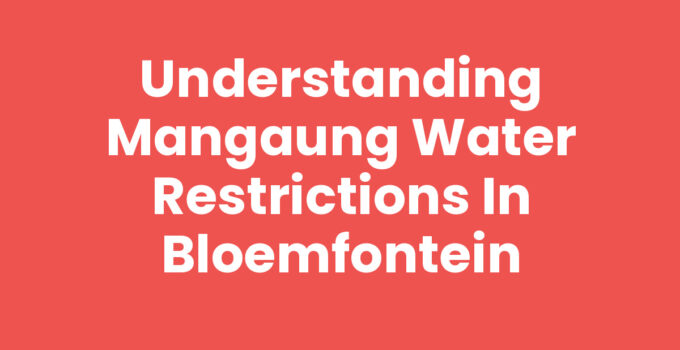The Mangaung Metropolitan Municipality, which encompasses Bloemfontein, is currently facing significant challenges with water supply. As a result, water restrictions have been implemented to conserve this precious resource. In this article, we will delve into the causes of these restrictions, what they entail, and how residents and businesses can adapt to ensure responsible water use.
Mangaung Water Restrictions, Bloemfontein: Everything You Need to Know
Water restrictions in Mangaung, particularly in Bloemfontein, are a crucial response to the ongoing water scarcity crisis. These measures are vital for ensuring the sustainability of the water supply for both household and commercial use. Here’s a step-by-step guide on understanding these restrictions and how to comply:
1. What Are the Current Restrictions?
As of now, the Mangaung Metropolitan Municipality has implemented the following water restrictions:
- No watering of gardens on weekdays.
- Garden watering is allowed only on weekends with a limited amount of water.
- Use of hose pipes is prohibited, but hand watering with a bucket is permitted.
- Restrictions on filling swimming pools, with penalties for non-compliance.
- Public awareness campaigns to educate residents about the importance of water conservation.
2. Understanding the Causes of These Restrictions
Several factors have contributed to the implementation of water restrictions in Bloemfontein:
- Severe Drought: Like many regions in South Africa, Bloemfontein has experienced unusually low rainfall, leading to diminished water reserves.
- Aging Infrastructure: Much of the water supply infrastructure in the region is old and prone to leaks, which further compounds water loss.
- Increased Demand: With a growing population and urbanization, the demand for water has surged, straining the existing supply.
3. How Residents Can Adapt and Save Water
Adapting to water restrictions requires creative strategies and a commitment to conservation from all residents. Here are some effective tips:
- Practice Smart Irrigation: Water your plants early in the morning or late in the evening to minimize evaporation.
- Choose Native Plants: Landscaping with drought-resistant plants can cut down on water use significantly.
- Fix Leaks: Regularly check your plumbing and fixtures for leaks. Even small leaks can waste a large amount of water over time.
- Use Water-Saving Appliances: Invest in low-flush toilets, water-efficient showerheads, and other appliances designed to reduce water usage.
- Collect Rainwater: If feasible, set up a rainwater harvesting system to collect water for garden use.
Related Guide: Expert CCTV Camera Installation Bloemfontein: Complete Guide
Impacts of Water Restrictions on the Community
The water restrictions in Mangaung, while necessary, have significant effects on the community:
- Economic Impact: Businesses, especially in agriculture and hospitality, may experience reduced productivity due to water shortages.
- Social Adjustments: Residents are encouraged to engage in community discussions about innovative ways to save water.
- Environmental Benefits: These restrictions highlight the importance of sustainable water usage and encourage long-term conservation habits.
Check This: Discover Amazing Townhouses for Sale in Bloemfontein
Conclusion
Water restrictions in Bloemfontein are a response to an urgent water crisis, driven by factors such as drought and infrastructure issues. By understanding the restrictions and taking proactive steps to conserve water, residents can play a crucial role in addressing this challenge. It’s important to remain informed and adaptable as the situation evolves, ensuring that the community continues to thrive even in the face of adversity.
Read Also: Boston City Campus Bloemfontein Fees: Complete Guide 2023
Frequently Asked Questions
What are the main reasons for the water restrictions in Bloemfontein?
Water restrictions are mainly due to severe drought, aging infrastructure, and increased water demand.
How can residents conserve water during restrictions?
Residents can conserve water by practicing smart irrigation, choosing native plants, fixing leaks, and using water-saving appliances.
What penalties exist for violating water restrictions?
Penalties for violating water restrictions may include fines and restrictions on water usage in residential and commercial properties.



